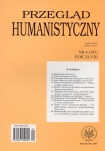Rozważania o powieści Josepha Conrada pt. Chance
Reflections on Joseph Conrad’s Novel Chance
Author(s): Barbara KocSubject(s): Cultural Essay, Political Essay, Societal Essay
Published by: Wydawnictwa Uniwersytetu Warszawskiego
Keywords: Joseph Conrad; Chance; romantyzm
Summary/Abstract: Conrad’s novel Chance appeared in 1912, in the times of extreme pursuit of philosophical precision and subjecting it to the critics of reason. (There was a British analytic school of realists in the years 1904–1912). The method is popularized in Encyclopaedia of Religion and Ethics (1910), in a scholarly study supported by numerous works referring to philosophy. Apparently, “Chance” preserves in its meaning the primitive faith in fate, but on the other hand, acquires modern qualities referring to the theory of probability and the concept of chance. The notion of “Chance” does not, actually, deny causality. It includes neither good nor bad, nor it has any moral meaning. Conrad’s novel shows traces of the times and has qualities corresponding to the assumptions of realists’ philosophy: ‘to acquire an open attitude and not to foresee the outcome’. The motto of the work is the most accurate comment: ‘Those, that hold that all things are governed by fortune had not erred, had they not persisted there’. Conrad attacks the total power of fortune and reminds other meanings of the word ‘fate’, ‘necessity’, ‘lot’, ‘destiny’ – when it comes to the inevitable. ‘Chance’, however, in the sense of an objective happening, is called by Conrad ‘pure accident’ and is defined as follows: ‘By accident I mean that which happens blindly and without intelligent design’. The notion includes disposition, potential which a man can alone and should use. The adventurous-sensational plot of the novel includes a great degree of Romanticism in the story of a maid alienated by life and her husband, captain of the ship ‘Ferndale’. With slight irony, Conrad presents lofty chivalry of the hero in the course of action. Precise analytic thinking, associated with the development of the couple’s love, among extremely complex events of other people’s reality, provides room for deep interest in human fortune in Conrad’s works. Each character faces a chance which can be won. The success of the novel has been reflected in its translation into European languages. Ideas for titles of individual translators reveal difficulties to achieve the ambiguity of the English word ‘chance’. The most successful seems the title of the German translation: Spiel des Zufalls.
Journal: Przegląd Humanistyczny
- Issue Year: 426/2009
- Issue No: 05-06
- Page Range: 135-142
- Page Count: 8
- Language: Polish
- Content File-PDF

